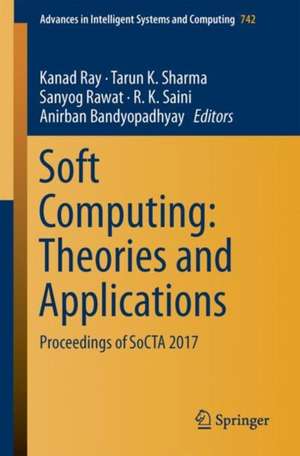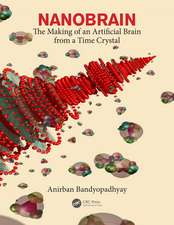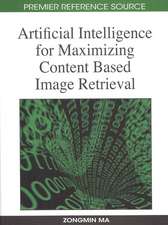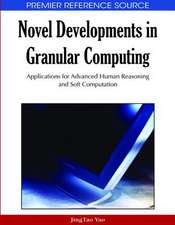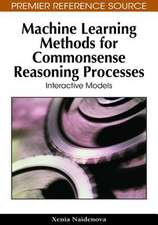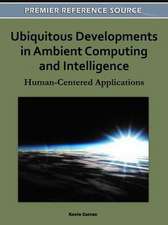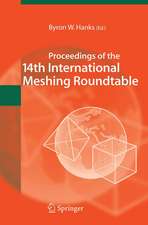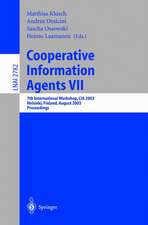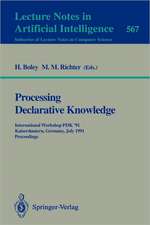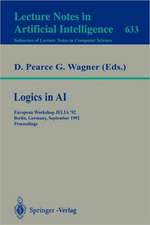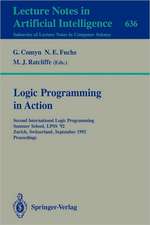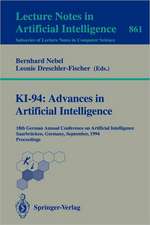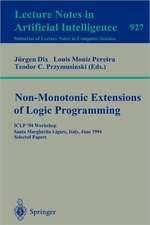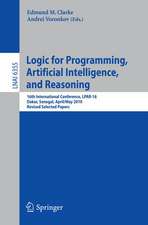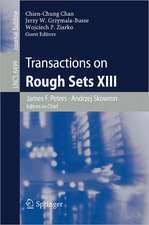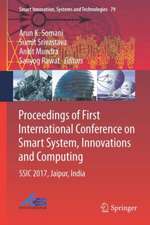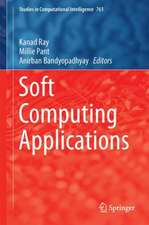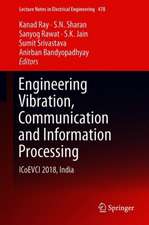Soft Computing: Theories and Applications: Proceedings of SoCTA 2017: Advances in Intelligent Systems and Computing, cartea 742
Editat de Kanad Ray, Tarun K. Sharma, Sanyog Rawat, R. K. Saini, Anirban Bandyopadhyayen Limba Engleză Paperback – 31 aug 2018
Din seria Advances in Intelligent Systems and Computing
- 20%
 Preț: 1120.90 lei
Preț: 1120.90 lei - 20%
 Preț: 1090.59 lei
Preț: 1090.59 lei - 20%
 Preț: 1324.07 lei
Preț: 1324.07 lei - 20%
 Preț: 1989.79 lei
Preț: 1989.79 lei - 20%
 Preț: 1946.92 lei
Preț: 1946.92 lei - 18%
 Preț: 1273.28 lei
Preț: 1273.28 lei - 20%
 Preț: 2264.51 lei
Preț: 2264.51 lei - 20%
 Preț: 1337.27 lei
Preț: 1337.27 lei - 20%
 Preț: 1297.67 lei
Preț: 1297.67 lei - 20%
 Preț: 1315.82 lei
Preț: 1315.82 lei - 20%
 Preț: 1310.88 lei
Preț: 1310.88 lei - 20%
 Preț: 1302.62 lei
Preț: 1302.62 lei - 20%
 Preț: 882.20 lei
Preț: 882.20 lei - 20%
 Preț: 1305.93 lei
Preț: 1305.93 lei - 20%
 Preț: 1629.32 lei
Preț: 1629.32 lei - 20%
 Preț: 1345.49 lei
Preț: 1345.49 lei - 18%
 Preț: 1227.52 lei
Preț: 1227.52 lei - 18%
 Preț: 1290.64 lei
Preț: 1290.64 lei - 20%
 Preț: 1041.10 lei
Preț: 1041.10 lei - 20%
 Preț: 1034.52 lei
Preț: 1034.52 lei - 20%
 Preț: 1298.50 lei
Preț: 1298.50 lei - 20%
 Preț: 1330.67 lei
Preț: 1330.67 lei - 20%
 Preț: 1483.28 lei
Preț: 1483.28 lei - 20%
 Preț: 1971.64 lei
Preț: 1971.64 lei - 20%
 Preț: 1006.48 lei
Preț: 1006.48 lei - 20%
 Preț: 1471.75 lei
Preț: 1471.75 lei - 20%
 Preț: 1471.56 lei
Preț: 1471.56 lei - 20%
 Preț: 1454.40 lei
Preț: 1454.40 lei - 20%
 Preț: 1494.84 lei
Preț: 1494.84 lei - 20%
 Preț: 1269.64 lei
Preț: 1269.64 lei - 20%
 Preț: 1481.64 lei
Preț: 1481.64 lei - 20%
 Preț: 1192.08 lei
Preț: 1192.08 lei - 20%
 Preț: 1298.50 lei
Preț: 1298.50 lei - 20%
 Preț: 1489.07 lei
Preț: 1489.07 lei - 20%
 Preț: 825.78 lei
Preț: 825.78 lei - 20%
 Preț: 1649.93 lei
Preț: 1649.93 lei - 20%
 Preț: 1463.49 lei
Preț: 1463.49 lei - 20%
 Preț: 1438.77 lei
Preț: 1438.77 lei - 20%
 Preț: 1474.22 lei
Preț: 1474.22 lei - 20%
 Preț: 1298.50 lei
Preț: 1298.50 lei - 20%
 Preț: 1327.35 lei
Preț: 1327.35 lei - 20%
 Preț: 1973.31 lei
Preț: 1973.31 lei - 18%
 Preț: 947.04 lei
Preț: 947.04 lei - 18%
 Preț: 1441.39 lei
Preț: 1441.39 lei - 20%
 Preț: 638.55 lei
Preț: 638.55 lei - 20%
 Preț: 1320.76 lei
Preț: 1320.76 lei - 20%
 Preț: 1948.56 lei
Preț: 1948.56 lei
Preț: 1009.42 lei
Preț vechi: 1261.77 lei
-20% Nou
Puncte Express: 1514
Preț estimativ în valută:
193.18€ • 200.93$ • 159.48£
193.18€ • 200.93$ • 159.48£
Carte tipărită la comandă
Livrare economică 14-28 aprilie
Preluare comenzi: 021 569.72.76
Specificații
ISBN-13: 9789811305887
ISBN-10: 9811305889
Pagini: 730
Ilustrații: XX, 729 p. 262 illus., 171 illus. in color.
Dimensiuni: 155 x 235 mm
Greutate: 1.03 kg
Ediția:1st ed. 2019
Editura: Springer Nature Singapore
Colecția Springer
Seria Advances in Intelligent Systems and Computing
Locul publicării:Singapore, Singapore
ISBN-10: 9811305889
Pagini: 730
Ilustrații: XX, 729 p. 262 illus., 171 illus. in color.
Dimensiuni: 155 x 235 mm
Greutate: 1.03 kg
Ediția:1st ed. 2019
Editura: Springer Nature Singapore
Colecția Springer
Seria Advances in Intelligent Systems and Computing
Locul publicării:Singapore, Singapore
Cuprins
Chapter 1: An Analysis of Authors productivity in RFID & Supply Chain Management.- Chapter 2: Meta Heuristic Techniques Study for Fault Tolerant in Cloud Computing Environment: A Survey Work.- Chapter 3: Complexity Metrics for Component Based Software System.- Chapter 4: DESIGN AND ANALYSIS OF ON-CHIP LOW POWER, LOW DROP-OUT VOLTAGE REGULATOR using FFRC and MCC Techniques.- Chapter 5: Study and Analysis of Back-Propagation Approach in Artificial Neural Network using HOG Descriptor for Real-time Object Classification.- Chapter 6: Identification of relevant stochastic input variables for prediction of daily PM10 using Artificial Neural Networks.- Chapter 7: Field based Weighting Information Retrieval on Document field of Ad hoc dataset .
Notă biografică
Dr. Kanad Ray is a Professor and Head of Physics at the Amity School of Applied Sciences Physics, Amity University Rajasthan (AUR), Jaipur, India. He has obtained M.Sc. and Ph.D. degrees in Physics from Calcutta University and Jadavpur University , West Bengal, India. In an academic career spanning over 22 years, he has published and presented research papers in several national and international journals and conferences in India and abroad. He has authored a book on the Electromagnetic Field Theory. Prof. Ray’s current research areas of interest include cognition, communication, electromagnetic field theory, antenna & wave propagation, microwave, computational biology, and applied physics. He has served as the Editor of Springer Book Series. Presently, he is an Associate Editor of the Journal of Integrative Neuroscience published by the IOS Press, Netherlands. He has established a Memorandum of Understanding (MOU) between his University and University of Montreal, Canada for various joint research activities. He has also established collaboration with the National Institute for Materials Science (NIMS), Japan for joint research activities and visits NIMS as a visiting Scientist. He organizes international conference series such as SoCTA and ICoEVCI as General Chair. He is an Executive Committee member of the IEEE Rajasthan Chapter.
Dr. Tarun Kumar Sharma has a Ph.D. in Artificial Intelligence as well as MCA and MBA degrees, and is currently associated with the Amity University Rajasthan (AUR) in Jaipur. His research interests encompass swarm intelligence, nature-inspired algorithms and their applications in software engineering, inventory systems, and image processing. He has published more than 60 research papers in international journals and conferences. He has over 13 years of teaching experience and has also been involved in organizing international conferences. He is a certified internal auditor and a member of the Machine Intelligence Research (MIR) Labs, WA, USA and Soft Computing Research Society, India.
Dr. R.K. Saini is the Director of Institute of Engineering and Technology, Bundelkhand University, Jhansi, India. He specializes in the fields of real analysis, fuzzy set theory, operator theory, fuzzy optimization, and Summability theory. He is currently working on fuzzy transportation and assignment problems, fuzzy logics and soft computing. Dr. Saini has published 70 research papers.
Dr. Sanyog Rawat is currently associated with the Department of Electronics & Communication Engineering, SEEC, Manipal University Jaipur, India. He holds a B.E. in Electronics and Communication, an M.Tech. in Microwave Engineering and Ph.D. in Planar Antennas. Dr. Rawat has been involved in organizing various workshops on “LabVIEW” and antenna designs and simulations using FEKO. He has taught various subjects, including electrical science, circuits & system, communication system, microprocessor systems, microwave devices, antenna theory & design, advanced microwave engineering and digital circuits.
Dr. Anirban Bandyopadhyay is a Senior Scientist at the National Institute for Materials Science (NIMS), Tsukuba, Japan. He completed his Ph.D. in Supramolecular Electronics at the Indian Association for the Cultivation of Science (IACS), Kolkata, 2005. From 2005 to 2008 he was an independent researcher, as an ICYS research fellow at the International Center for Young Scientists (ICYS), NIMS, Japan, where he worked on the brain-like bio-processor building. In 2008, he joined as a permanent scientist at NIMS, working on the cavity resonator model of human brain and design synthesis of brain-like organic jelly. From 2013 to 2014 he was a visiting Scientist at the Massachusetts Institute of Technology (MIT), USA. He has received several honors, such as the Hitachi Science and Technology award 2010, Inamori Foundation award 2011–2012,Kurata Foundation Award, Inamori Foundation Fellow (2011–), and Sewa Society international member, Japan. He has patented ten inventions such as (i) a time crystal model for building an artificial human brain, (ii) geometric-musical language to operate a fractal tape to replace the Turing tape, (iii) fourth circuit element that is not memristor, (iii) cancer and Alzheimer’s drug, (iv) nano-submarine as a working factory and nano-surgeon, (vi) fractal condensation based synthesis, (vii) a thermal noise harvesting chip, (viii) a new generation of molecular rotors, (ix) spontaneous self-programmable synthesis (programmable matter), and (x) fractal grid scanner for dielectric imaging. He has also designed and built multiple machines and technologies, (i) Terahertz (THz)-magnetic nano-sensor, (ii) a new class of fusion resonator antennas etc. Currently, he is building time crystal based artificial brain using three ways, (i) knots of darkness made of fourth circuit element, (ii) integratedcircuit design, and (iii) organic supramolecular structure.
Dr. Tarun Kumar Sharma has a Ph.D. in Artificial Intelligence as well as MCA and MBA degrees, and is currently associated with the Amity University Rajasthan (AUR) in Jaipur. His research interests encompass swarm intelligence, nature-inspired algorithms and their applications in software engineering, inventory systems, and image processing. He has published more than 60 research papers in international journals and conferences. He has over 13 years of teaching experience and has also been involved in organizing international conferences. He is a certified internal auditor and a member of the Machine Intelligence Research (MIR) Labs, WA, USA and Soft Computing Research Society, India.
Dr. R.K. Saini is the Director of Institute of Engineering and Technology, Bundelkhand University, Jhansi, India. He specializes in the fields of real analysis, fuzzy set theory, operator theory, fuzzy optimization, and Summability theory. He is currently working on fuzzy transportation and assignment problems, fuzzy logics and soft computing. Dr. Saini has published 70 research papers.
Dr. Sanyog Rawat is currently associated with the Department of Electronics & Communication Engineering, SEEC, Manipal University Jaipur, India. He holds a B.E. in Electronics and Communication, an M.Tech. in Microwave Engineering and Ph.D. in Planar Antennas. Dr. Rawat has been involved in organizing various workshops on “LabVIEW” and antenna designs and simulations using FEKO. He has taught various subjects, including electrical science, circuits & system, communication system, microprocessor systems, microwave devices, antenna theory & design, advanced microwave engineering and digital circuits.
Dr. Anirban Bandyopadhyay is a Senior Scientist at the National Institute for Materials Science (NIMS), Tsukuba, Japan. He completed his Ph.D. in Supramolecular Electronics at the Indian Association for the Cultivation of Science (IACS), Kolkata, 2005. From 2005 to 2008 he was an independent researcher, as an ICYS research fellow at the International Center for Young Scientists (ICYS), NIMS, Japan, where he worked on the brain-like bio-processor building. In 2008, he joined as a permanent scientist at NIMS, working on the cavity resonator model of human brain and design synthesis of brain-like organic jelly. From 2013 to 2014 he was a visiting Scientist at the Massachusetts Institute of Technology (MIT), USA. He has received several honors, such as the Hitachi Science and Technology award 2010, Inamori Foundation award 2011–2012,Kurata Foundation Award, Inamori Foundation Fellow (2011–), and Sewa Society international member, Japan. He has patented ten inventions such as (i) a time crystal model for building an artificial human brain, (ii) geometric-musical language to operate a fractal tape to replace the Turing tape, (iii) fourth circuit element that is not memristor, (iii) cancer and Alzheimer’s drug, (iv) nano-submarine as a working factory and nano-surgeon, (vi) fractal condensation based synthesis, (vii) a thermal noise harvesting chip, (viii) a new generation of molecular rotors, (ix) spontaneous self-programmable synthesis (programmable matter), and (x) fractal grid scanner for dielectric imaging. He has also designed and built multiple machines and technologies, (i) Terahertz (THz)-magnetic nano-sensor, (ii) a new class of fusion resonator antennas etc. Currently, he is building time crystal based artificial brain using three ways, (i) knots of darkness made of fourth circuit element, (ii) integratedcircuit design, and (iii) organic supramolecular structure.
Textul de pe ultima copertă
The book focuses on soft computing and its applications to solve real-world problems occurring in different domains ranging from medicine and healthcare, and supply chain management to image processing and cryptanalysis. It includes high-quality papers presented in the International Conference on Soft Computing: Theories and Applications (SoCTA 2017), organized by Bundelkhand University, Jhansi, India. Offering significant insights into soft computing for teachers and researchers alike, the book inspires more researchers to work in the field of soft computing.
Caracteristici
Focuses on soft computing and its applications to solve real-world problems Offers insights into soft computing for teachers and researchers Inspires researchers to work in the field of soft computing
